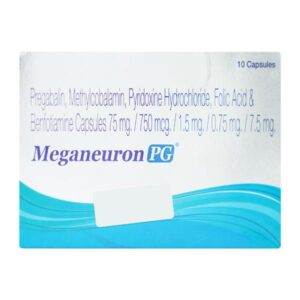ALPHA LIPOIC ACID + MECOBALAMIN
Alpha Lipoic Acid: Alpha Lipoic Acid (ALA) is a naturally occurring compound that is synthesized in small amounts by the body. It is found in many foods, such as liver, spinach, broccoli, and potatoes. ALA is considered a potent antioxidant and is believed to have various health benefits.
One of the primary uses of Alpha Lipoic Acid is to treat peripheral neuropathy, a condition characterized by nerve damage resulting in numbness, tingling, and pain in the extremities. It is also used as a supplement for its antioxidant properties, which help to protect cells from oxidative stress and free radical damage. ALA is also believed to enhance insulin sensitivity, making it potentially beneficial for individuals with diabetes or prediabetes.
The mechanism of action of Alpha Lipoic Acid is multifaceted. It functions as a potent antioxidant, helping to neutralize free radicals and prevent oxidative damage to cells and tissues. Additionally, ALA can regenerate other antioxidants such as vitamin C, vitamin E, and glutathione, increasing their effectiveness. It also possesses anti-inflammatory properties, which may contribute to its therapeutic effects.
When used for peripheral neuropathy, ALA is typically administered orally as a supplement. The recommended dosage varies depending on the specific condition and individual needs, but it is commonly around 600-1200 mg per day. It is advisable to consult a healthcare provider for appropriate dosing guidance.
Alpha Lipoic Acid is generally well-tolerated and considered safe for most people. However, like any medication or supplement, it can cause side effects in some individuals. Common side effects may include gastrointestinal issues such as nausea, vomiting, and stomach discomfort. In rare cases, allergic reactions may occur. ALA may also interact with certain medications, so it is crucial to inform your healthcare provider of any other medications or supplements you are taking.
It is important to note that while Alpha Lipoic Acid shows promise in various health conditions, further research is needed to establish its efficacy and safety conclusively. Therefore, it is advisable to consult with a healthcare professional before starting any new supplement or medication.
Mecobalamin: Mecobalamin, also known as methylcobalamin, is a type of vitamin B12 that is used as a supplement or medication. It is an active form of vitamin B12 and is involved in various physiological processes in the body.
Mecobalamin is mainly indicated for the treatment and prevention of vitamin B12 deficiency. It is commonly prescribed for conditions such as pernicious anemia, diabetic neuropathy, and other neuropathic pain syndromes. It may also be used in patients with malabsorption issues or in those who follow a vegan or vegetarian diet, which is often low in vitamin B12.
The exact mechanism of action of Mecobalamin is not fully understood, but it is known to play a vital role in the synthesis of DNA, normal red blood cell production, and the maintenance of healthy nerve cells. It acts as a coenzyme in the body and is involved in the metabolism of amino acids and fatty acids.
The recommended dose of Mecobalamin may vary depending on the patient’s condition and age. Typically, oral tablets or capsules are available in strengths of 500 mcg to 1 mg. It is usually taken once daily, although higher doses may be prescribed in some cases. Injections are also available, typically administered intramuscularly, and the dosage may vary.
Like most medications, Mecobalamin can cause side effects, although they are generally rare and mild. Potential side effects may include nausea, upset stomach, diarrhea, headache, dizziness, and a feeling of swelling in the body. Allergic reactions to Mecobalamin are uncommon but may occur in some individuals. If any unusual or severe side effects are experienced, it is important to seek medical attention.
It is worth noting that Mecobalamin is generally considered safe for most individuals, including pregnant and breastfeeding women. However, it is always advisable to consult with a healthcare professional before starting any new medication or supplement to ensure it is suitable and safe for individual circumstances.

